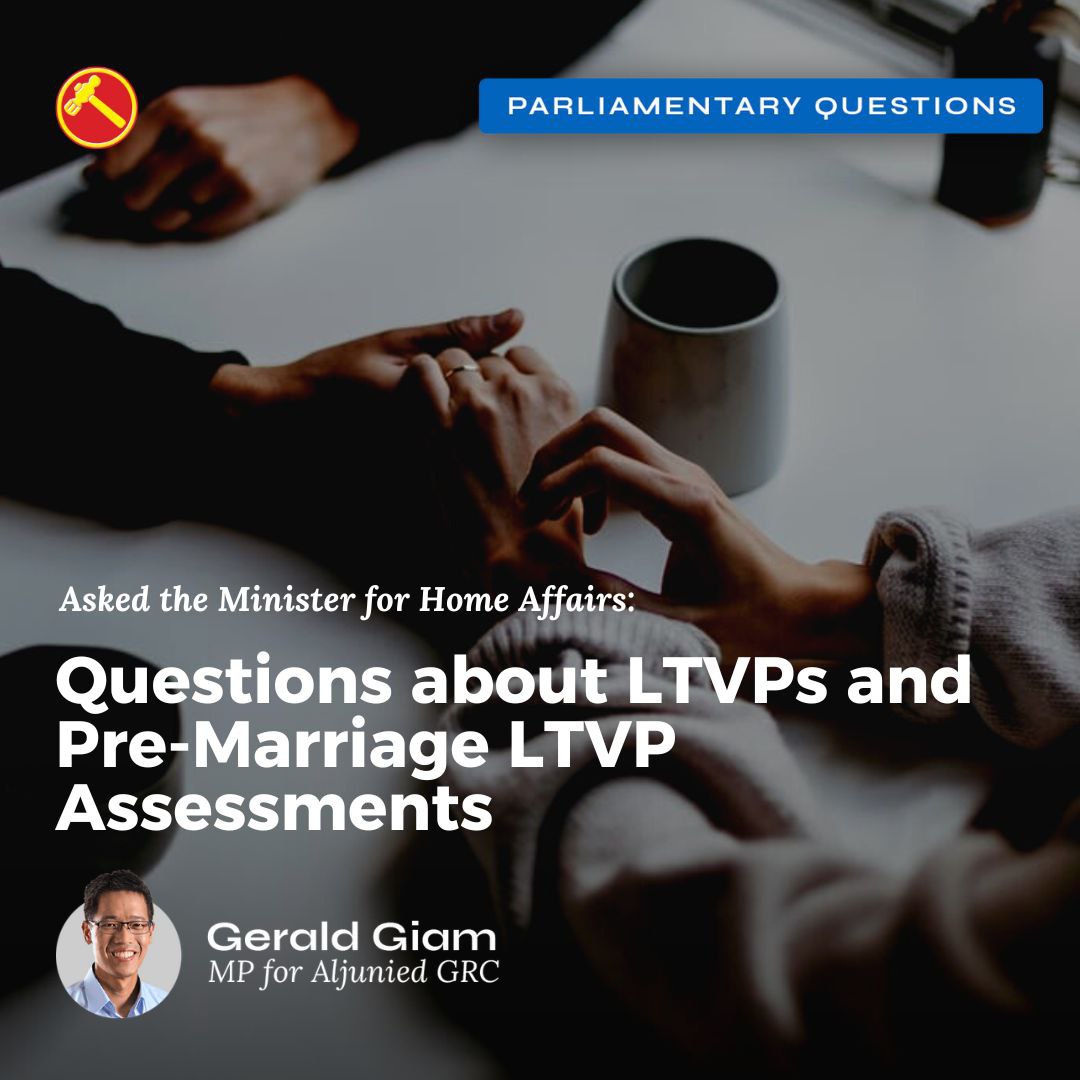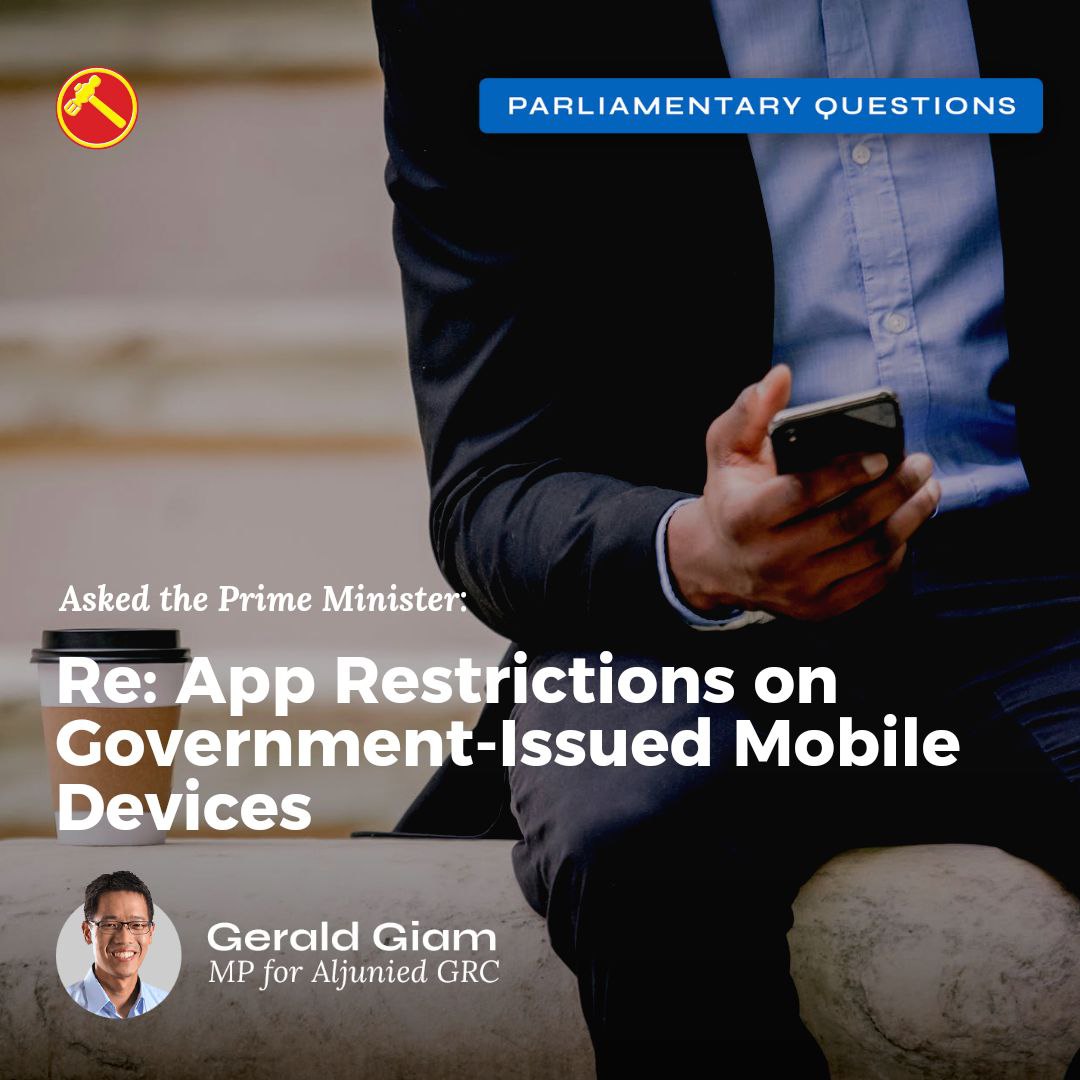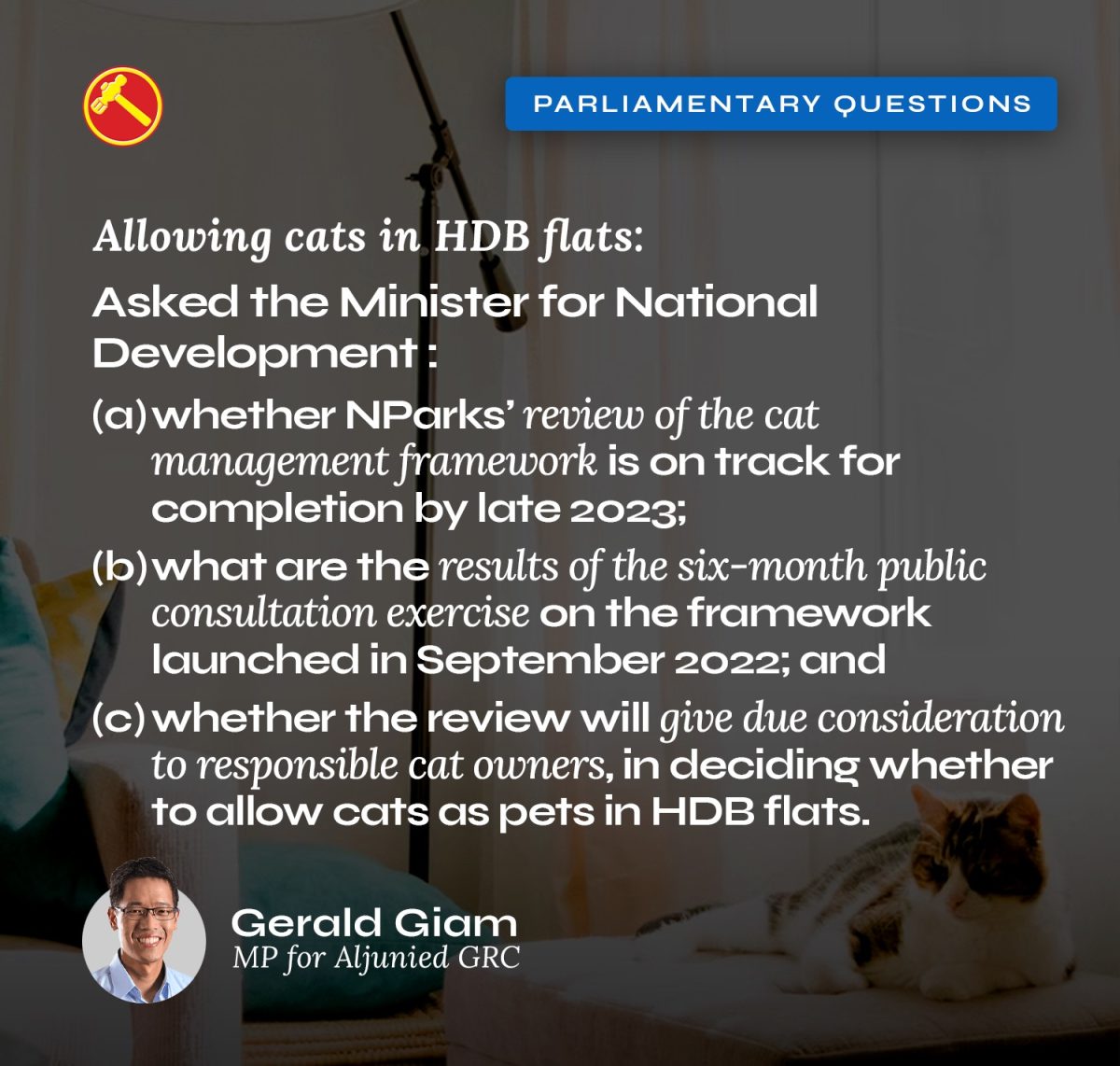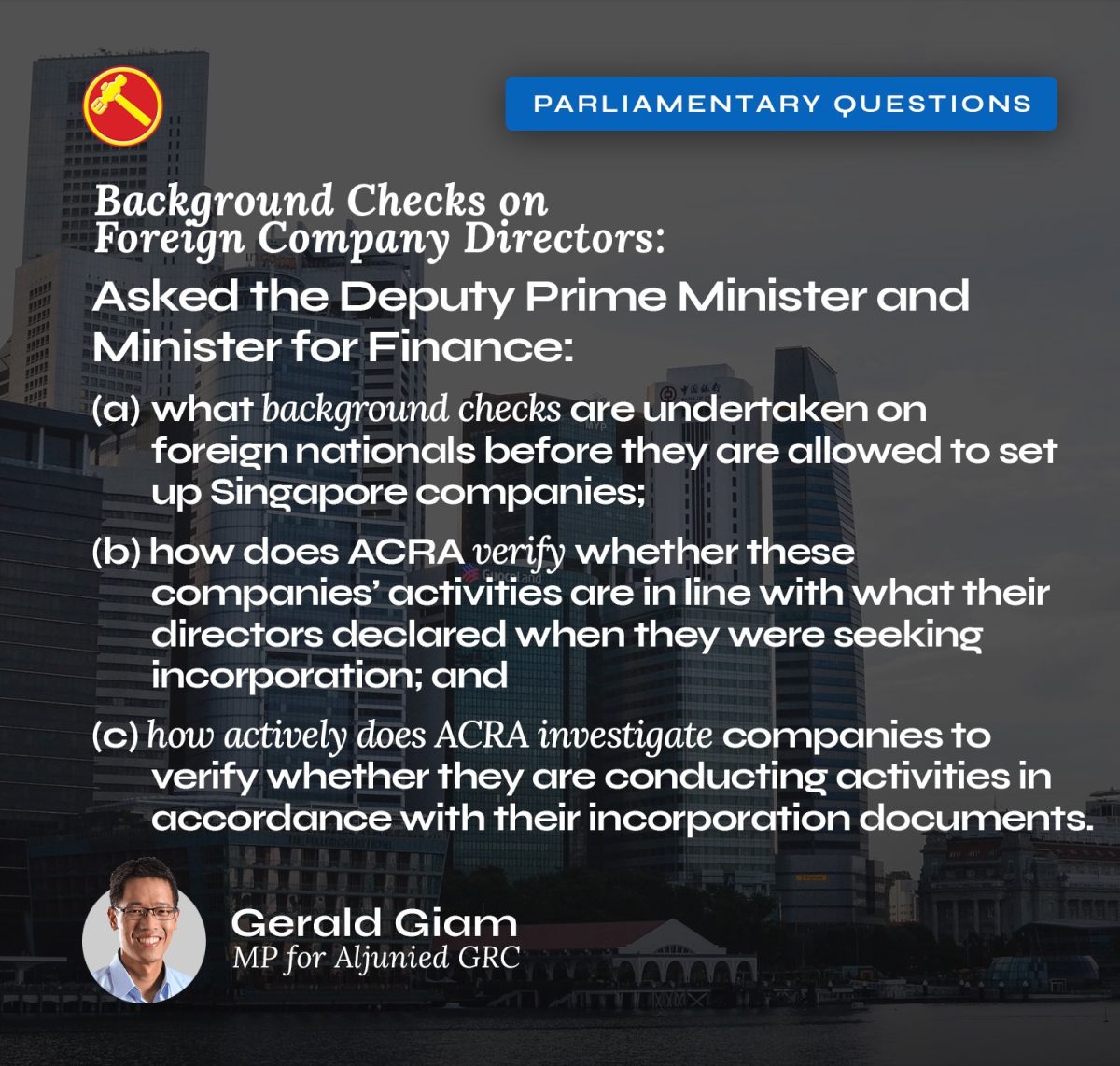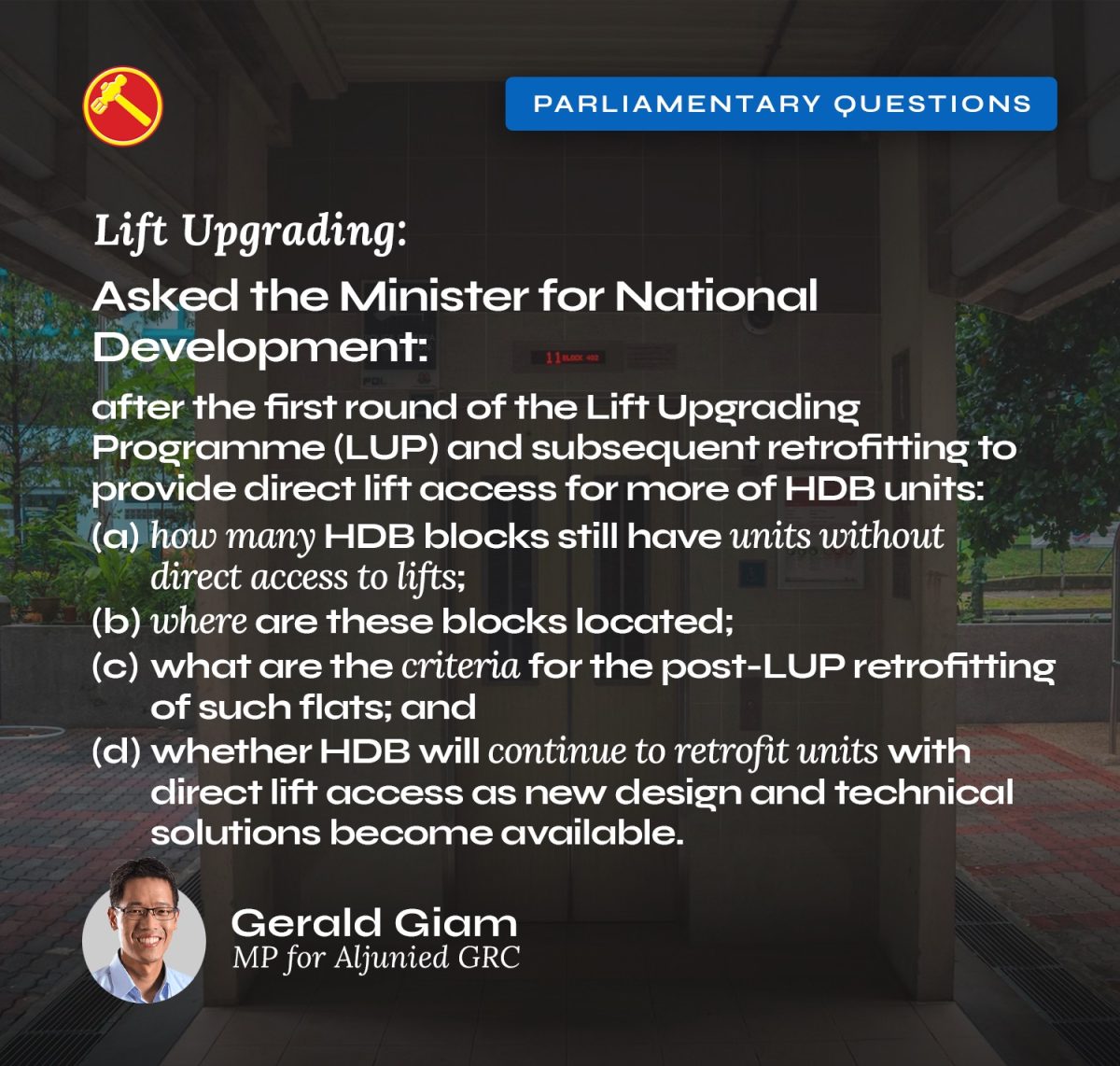Mr Speaker Sir,
I will be addressing two areas of amendments in the Immigration (Amendment) Bill, namely, digitalising and automating immigration processes, and the administration of immigration passes and permits.
Automating immigration processes
The Bill will introduce provisions to support ICA’s (Immigration and Checkpoints Authority) New Clearance Concept (NCC) to further automate immigration clearance. I appreciate that ICA is in the forefront of immigration technology, but have three concerns to highlight regarding the roll out of the NCC.
First, MOS (Minister of State) Faishal told the House on April 21st that under the NCC, “all manual counters and automated lanes will be replaced in phases with the next generation Automated Border Clearance System gates”. Does this mean that once NCC is fully rolled out, the use of manual counters will no longer be an option for Singaporean travellers?
Some categories of travellers frequently face difficulties in the process of clearing immigration. For example, some elderly citizens are unable to provide usable fingerprints due to their dry skin. Wheelchair users may have difficulty getting their irises scanned due to the height and angle of the scanners. Iris recognition systems could become prone to error as people’s irises change with age or after cataract surgery. And the biometrics of young children are still developing and may change over time.
Will the NCC include reasonable accommodations like wider gates for wheelchair users and adjustable scanners that can capture biometrics from travellers who cannot hold their head up for long?
Most importantly, will Special Assistance Lanes which are manned by ICA officers continue to be provided at the passenger halls of Changi Airport and all land and sea checkpoints, and will they be easily accessible by all travellers with special needs?
Second, I note that the Bill empowers the Minister to authorise the disclosure of passenger information to the airport operator for specific uses. Does this “airport operator” refer to only the Changi airport operator or also operators of foreign airports? Do the “specific uses” include the sharing of Singaporeans’ biometric data? What enhanced safeguards are in place to ensure data security, particularly if Singaporeans’ data will be shared with third party vendors or foreign governments, over which we have little control?
And third, I note that Singapore is one of the first countries in the world to implement NCC-type capabilities. As shared by MOS Faishal in April, some of these capabilities will be implemented in a form and manner not used or tested elsewhere. I also recall that the four-and-a-half hour disruption to immigration systems on March 31st was caused by a failed upgrade of the Multi-Modal Biometrics System (MMBS).
May I ask if the MMBS has since been fully upgraded? What additional contingency plans will ICA put in place to ensure that the upgrade to the NCC will not cause immigration disruptions of that scale or worse?
Administration of immigration passes and permits
Another key area of amendments in the Bill is to enable the ICA to more efficiently administer immigration passes and permits issued to foreigners and PRs (Permanent Residents).
Cross-national marriages between a Singaporean and a foreigner make up about a quarter of all marriages in Singapore. Foreign spouses face many challenges settling down in Singapore, the chief of which is obtaining permission from the Government to remain in Singapore for the long term. This can be achieved, first, through securing an LTVP (Long Term Visit Pass) and, subsequently, PR.
For foreign spouses who hold university degrees and draw high salaries, obtaining an LTVP, PR and even citizenship is usually not difficult, since their income and skills add great weight to their applications. But those with low educational qualifications and incomes face far greater challenges in obtaining long-term residency.
At my Meet the People Sessions, which are attended mainly by residents in the lower income group, about a fifth of cases involve immigration matters. The Singaporean residents who approach me are usually disappointed that their foreign spouse’s LTVP or PR applications were unsuccessful and want me to make appeals for them. Some share with me their deep longing to start a family, but their hesitation due to their spouse’s uncertain immigration status. Most don’t understand why the applications were rejected because no reasons are provided by ICA.
During a 2012 Parliamentary exchange between Ms Indranee Rajah and the then-MOS (Home Affairs), Mr Masagos Zulkifli, Ms Rajah highlighted three cases of Singaporeans with prior convictions who were facing difficulties getting their foreign spouse’s LTVP approved. Mr Masagos agreed with Ms Rajah that families are the pillar of support for ex-offenders, but clarified that the “family” in this case referred to an “existing family unit”, not a new family unit formed when the ex-offender got married soon after his release. He added that “an offender just out of prison has many issues to deal with and an environment he is not familiar with anymore.” He further stated that “should a marriage not work out or the husband reoffends, the spouse who is a foreigner will not have relatives in Singapore to turn to nor jobs to sustain herself or her children as many are generally low skilled.”
Parents and siblings are not the only pillar of support for ex-offenders. Many may be estranged from their “existing” families or may have suffered divorce while incarcerated, and are starting anew. In fact, having a spouse provides stability and an added incentive for them to remain crime-free.
We should not deny ex-offenders who have served out their prison sentence the right to get married to anyone they choose to. Similarly, once they are married, it would be most unfair for the State to deny or delay a foreign spouse’s long term residency on account of an ex-offender’s past conviction. This could put a strain on their marriage and finances, and keep the ex-offender locked in a “second prison”.
The Government should not make it difficult for a married couple to stay together by denying an LTVP to a foreign spouse or child of a Singaporean. Family formation is one of the core social values in Singapore and our immigration policy must support it.
In 2015, ICA introduced the Pre-Marriage LTVP Assessment (PMLA) to give prospective cross-national couples an indication if the foreign spouse is likely to qualify for an LTVP after the marriage. However, since the PMLA was introduced, out of an annual average of 7,200 LTVP applications, only 3,000 applicants — or less than half — had completed the PMLA prior to applying for the LTVP, according to a reply by the Minister to my question last month.
In my conversations with residents who face difficulty getting an LTVP for their foreign spouses, most were unaware of the PMLA before they tied the knot. Does the Registry of Marriages (ROM) and the Registry of Muslim Marriages (ROMM) advise cross-national couples to complete the PMLA before getting married? I am aware that the ROM website advises them to undergo a PMLA. However, is this highlighted to the couple in person before the marriage registration process, keeping in mind that many of these couples may not be proficient in reading English?
Furthermore, even passing the PMLA is not a guarantee of obtaining an LTVP after marriage. In another reply to me last month, the Minister revealed that only 1,900 out of the 3,000 foreigners issued with Letters of LTVP Eligibility were eventually granted LTVP or LTVP-Plus, which means 37% were not. The Minister explained that not every person who has obtained a Letter of LTVP Eligibility goes on to apply for an LTVP but it is unclear if this fully accounts for the 37% gap.
The Minister has stated in this House that ICA generally does not disclose the reasons for unsuccessful applications for immigration facilities. This lack of transparency is out of step with practices in some other developed countries. In Canada, for spouse sponsorship applications that are refused, their government provides reasons for refusal in writing. Similarly, Australia’s Department of Home Affairs explicitly states that if Partner visa applications are refused, the Department will provide information on why the visa was refused.
Improving the immigration process for relatives of Singaporeans
I wish to propose four approaches that could improve ICA’s immigration process for the immediate family members of Singaporeans.
First, there should be disclosure of the broad reasons for rejection of LTVP, PR and citizenship applications by foreign spouses, children and parents of Singaporeans.
Singapore does not permit dual citizenship so this is our citizens’ only homeland. They do not have an easy option to settle in another country if their spouse is not given permission to live with them in Singapore for the long term, especially if they are from a low income group. When rejections happen without a reason, the Singaporean spouse can feel disconnected from their own nation. I have seen this in the eyes of my constituents who sought appeals for immigration applications for their spouses.
Second, where mitigation paths for future applications can be furnished, ICA should do so. For example, if an applicant was rejected because their economic contributions were not deemed sufficient, they should be informed of this, so that they could take steps to enter the workforce, upskill themselves and strive to perform better at work so as to earn promotions and salary increments. This is preferable over an opaque dead end.
Third, ICA should provide more criteria transparency to the immigration framework — similar to the COMPASS framework for employment passes. Previous answers by Ministers in this House have revealed the range of factors that are considered for LTVP, PR and citizenship applications. Why not list all these criteria clearly on the ICA website and on application forms, instead of expecting applicants to comb through the Parliament Hansard? Applications meeting these criteria should get fast tracked approval, with discretionary rejections allowed on a case-by-case basis.
The Minister told this House in 2018 that ICA does not share the “specific criteria or grounds for rejecting applications” due to concerns that “information about detailed assessment criteria can be abused to inflate an undeserving applicant’s chances of success” and that “some people could then try to game the system”.
In presenting the COMPASS (Complementarity Assessment) framework, which is used to evaluate foreigners’ employment passes and went live this month, the Government emphasised that it brings benefits like “transparency”, “clarity”, and “predictability” for businesses. COMPASS provides a points system, specific benchmarks for salaries and diversity, and employs objective data so firms can accurately assess where they stand. Indeed, the COMPASS criteria spell out in no uncertain terms how many points are awarded for various factors like salary, qualifications and improving diversity.
If the MOM (Ministry of Manpower) is comfortable with the disclosure and transparency in the COMPASS framework in order to provide businesses with clarity and predictability for manpower planning, then surely ICA can extend these same principles to Singaporeans and their foreign spouses, children or parents, who need the same clarity and predictability for their family planning.
The Minister also said that the “reasons for rejection may be used to arouse negative sentiments in other countries” and that “this may create bilateral sensitivities and is not in Singapore’s interest.”
It is a universally accepted principle that countries have the right to make their own decisions on immigration. In any case, ICA does not need to tell the applicant that they were rejected because they were from a particular country or of a particular race. If there are any reasons for rejection that may conceivably cause diplomatic friction, those need not be shared with the applicant. However, the vast majority of reasons for immigration rejections are not going to sour relations with other countries. Let’s not throw the baby out with the bathwater.
Lastly, ICA should provide clearer channels for immigration appeals. The Bill removes the statutory right of appeal to the Minister on decisions made by ICA on granting, revoking and varying conditions attached to PRs’ permits. I have no objections to the removal of this right. I agree that foreigners have no right to demand to enter or stay in Singapore, and I note from MHA’s statement that PR applicants and PRs may still seek ICA’s reconsideration of its decisions, particularly if there are new facts that were not previously submitted to ICA.
However, when searching the ICA website, I could not find much information on submitting appeals for failed LTVP and PR applications. The website only states that failed PR applicants may submit a fresh application if there are changes to their circumstances. Anecdotally, residents often tell me that they were advised by ICA officers to make an appeal through their MPs.
While I am grateful for the chance to engage with more constituents at my Meet the People Sessions, submitting appeals through one’s MP should not be the default means of communication between citizens and the government. An accessible, self-service channel should be made available, particularly for appeals with a substantial volume. A secure online form should be made available on the ICA website for all immigration appeals, with clear instructions guiding appellants to submit new facts that were not previously provided in their earlier application.
Conclusion
I believe these proposals will provide a balance between the Government’s prerogatives and the needs of Singaporean families, while upholding our national interest. They could lessen the anxiety and frustration that Singaporeans with foreign spouses, children or parents experience with the immigration process.
I support the Bill.
This was my speech in the debate in Parliament on the Immigration (Amendment) Bill on 18 September 2023.


